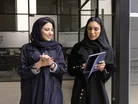Saudi Arabia unemployment lowers: More women enter workforce

Research conducted by S&P Global has found an increase in employment opportunities for women, especially in the private sector, increasing female labour force participation to 30% by 2030.
Increasing Saudi women’s participation in the workforce is not only a step towards equity, but S&P suggest that it will add US$39bn to the kingdom’s economy by 2032 if it continues at the same rate.
In 2022, the Saudi female workforce represented 37% in 2022, while the unemployment rate fell to 16% in the first quarter of this year, according to data from the General Authority for Statistics.
Labour market reforms lead to greater women in work
Saudi Arabia has sought to boost the role of women in business in 2023 as part of its Saudi Vision 2030. Typically, men are still more likely than women to work outside the home, but the disparity has narrowed significantly in the past 50 years, according to S&P.
Saudi Arabia is taking steps to close this gap, but still has a long way to go to catch up to other high-income countries. According to S&P, the country’s labour market reforms have led the country’s female labour force participation rate for Saudi nationals to nearly double to almost 36% in 2022 from 19% in 2016.
This, in turn, has boosted the overall participation rate to a record high of 61.7% in March 2023, compared with a record low of 54.2% in June 2017. It has been argued that this increase is a result of improved female education and cultural liberalisation, says S&P, with an additional drop in fertility rates leading more women to join the workforce.
Other measures introduced by Saudi Arabia to reduce barriers to women joining the labour force include, according to S&P, permitting them to drive, increasing remote and hybrid work arrangements and increasing the number of female jobs in the military.
It is clear that educational attainment has also improved for women, as nearly 32% of women aged 25 and up in Saudi Arabia held at least a bachelor's degree in 2020, versus 26% in 2017. S&P suggests that the rate is even higher than in some other developed or regional peers.
In addition, the female share of graduates from science, technology, engineering and mathematics programs stood at 36.8% in 2018, which is on par with or above countries like the US (38%), UK (34%), France (32%) and Germany (28%), while still below some regional peers like Oman (56%), Qatar (48%), the United Arab Emirates (41%) and Bahrain (41%).
******
For more business insights, check out the latest edition of Business Chief Middle East & Africa and be sure to follow us on LinkedIn and Twitter.
You may also be interested in the Business Chief US website.
Please also check out our upcoming event – Procurement & Supply Chain LIVE in London on September 26-27, 2023.
BizClik is a global provider of B2B digital media platforms that cover executive communities for CEOs, CFOs and CMOs, as well as leaders in Sustainability, Procurement & Supply Chain, Technology & AI, Cyber, FinTech & InsurTech. We also cover industries including Manufacturing, Mining, Energy, EV, Construction, Healthcare and Food & Drink.
BizClik, based in London, Dubai and New York, offers services such as content creation, advertising and sponsorship solutions, webinars and events.
- Saudi’s NEOM Partners with DSV on US$10bn Logistics HubLeadership & Strategy
- Saudi Arabia approves high-speed rail link with KuwaitLeadership & Strategy
- Top 10 GCC companies pioneering in the sustainability spaceSustainability
- Saudi's stc Group continues telco and IT growth strategyTechnology
Featured Articles
SAP has announced it has appointed a new President for a newly-created EMEA region, aiming to make the most of the opportunities of cloud and AI
technology
From fighter pilot to fashion house financier, Mohammed Alardhi has taken Investcorp to great heights – so what’s the secret to his success?
Dr Omar Al-Attas, Head of Environmental Protection and Regeneration at Red Sea Global, shares his COP28 hopes and approach to regenerative tourism
strategy

